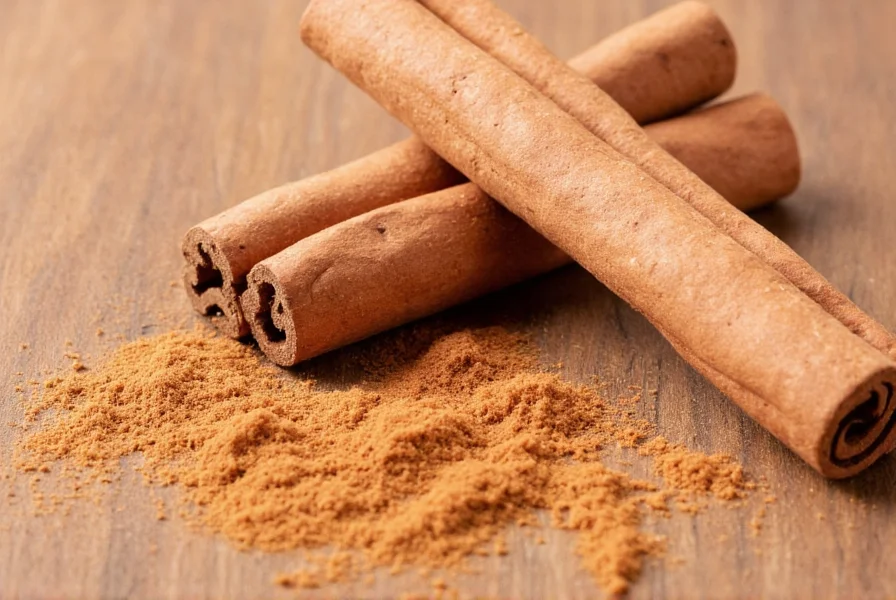True cinnamon (Cinnamomum verum), also known as Ceylon cinnamon, offers scientifically supported health benefits including blood sugar regulation, potent antioxidant effects, and anti-inflammatory properties. Unlike common cassia cinnamon, true cinnamon contains significantly lower levels of coumarin, making it safer for regular consumption. Research indicates it may help improve insulin sensitivity, reduce oxidative stress, and support cardiovascular health when consumed in appropriate amounts (typically 0.5-2 grams daily).
Understanding True Cinnamon: The Genuine Article
When discussing true cinnamon benefits, it's crucial to distinguish Cinnamomum verum from its more common cousin, cassia cinnamon. True cinnamon, native to Sri Lanka, features a delicate, sweet flavor and multiple thin layers that form a soft, hollow tube. This contrasts with cassia's single, hard, thick quill and stronger, more pungent taste.
Most cinnamon sold in supermarkets is actually cassia, which contains high levels of coumarin—a compound that can cause liver damage in sensitive individuals when consumed regularly. True cinnamon contains only trace amounts of coumarin (approximately 0.017g per kg), making it the safer choice for daily consumption.

Scientifically Supported Health Benefits of True Cinnamon
Blood Sugar Regulation
Multiple studies demonstrate that true cinnamon may help improve insulin sensitivity and blood glucose control. A comprehensive 2022 meta-analysis published in Nutrition Reviews found that cinnamon supplementation significantly reduced fasting blood glucose levels in individuals with metabolic disorders. The active compounds, particularly cinnamaldehyde and polyphenols, appear to mimic insulin and enhance glucose uptake by cells.
Powerful Antioxidant Properties
True cinnamon ranks among the most antioxidant-rich foods available. Research in the Journal of Agricultural and Food Chemistry shows it contains over 41 protective compounds, with particularly high levels of polyphenols. These antioxidants combat oxidative stress, which contributes to aging and numerous chronic diseases. In fact, cinnamon's ORAC (Oxygen Radical Absorbance Capacity) score exceeds that of many fruits and vegetables.
Anti-Inflammatory Effects
Chronic inflammation underlies many serious health conditions. The cinnamaldehyde in true cinnamon inhibits inflammatory pathways at the cellular level. A 2021 study in Phytotherapy Research demonstrated that cinnamon extract significantly reduced inflammatory markers in human subjects, suggesting potential benefits for conditions like arthritis.
True Cinnamon vs. Cassia: A Critical Comparison
| Characteristic | True Cinnamon (Ceylon) | Cassia Cinnamon |
|---|---|---|
| Scientific Name | Cinnamomum verum | Cinnamomum cassia |
| Coumarin Content | 0.017g/kg (very low) | 2.1-6.6g/kg (high) |
| Flavor Profile | Sweet, delicate, citrus notes | Strong, spicy, harsh |
| Physical Structure | Multiple thin layers, soft quill | Single thick, hard quill |
| Recommended Daily Limit | Up to 4 grams | Less than 1 gram |
How to Maximize True Cinnamon Benefits Safely
For those seeking the health benefits of Ceylon cinnamon, proper usage matters. Research suggests consuming 0.5-2 grams (approximately 1/4 to 1 teaspoon) daily provides measurable benefits without risk. Higher amounts don't necessarily yield better results and may cause digestive discomfort in sensitive individuals.
The most effective ways to incorporate true cinnamon include:
- Adding to morning oatmeal or smoothies
- Using in tea or warm almond milk
- Sprinkling on fruit or yogurt
- Including in savory dishes like curries
For maximum potency, choose freshly ground true cinnamon rather than pre-ground powder, as the volatile oils responsible for many benefits degrade over time. Store in an airtight container away from light and heat.
Important Considerations and Potential Risks
While true cinnamon health benefits are promising, several considerations ensure safe consumption:
- Pregnancy and breastfeeding: Limited research exists, so moderation is advised
- Medication interactions: May enhance effects of blood sugar-lowering medications
- Allergic reactions: Rare but possible, especially in those sensitive to related plants
- Quality matters: Look for "Cinnamomum verum" or "Ceylon" on labels
Individuals with liver conditions should consult healthcare providers before regular consumption, though true cinnamon's low coumarin content makes it significantly safer than cassia for this population.
Practical Applications in Daily Wellness
Integrating true cinnamon into your wellness routine requires more than just understanding its scientific evidence for cinnamon health benefits. Consider these practical approaches:
A simple cinnamon tea made by steeping 1 gram of true cinnamon in hot water for 10 minutes provides a soothing beverage that may help regulate blood sugar when consumed before meals. For those managing metabolic health, adding cinnamon to carbohydrate-rich meals appears to moderate the glycemic response.
Research suggests the antioxidant properties of true cinnamon remain stable even when cooked, making it valuable in both raw and cooked applications. Unlike many supplements, cinnamon delivers benefits through regular dietary incorporation rather than isolated compounds.

Conclusion: A Balanced Perspective on True Cinnamon
True cinnamon offers genuine health advantages supported by growing scientific evidence, particularly regarding blood sugar management, antioxidant protection, and inflammation reduction. Its significantly lower coumarin content compared to cassia makes it the preferred choice for regular consumption.
While not a miracle cure, incorporating moderate amounts of genuine Ceylon cinnamon into a balanced diet represents a practical, evidence-based approach to supporting metabolic and cardiovascular health. As with any natural remedy, consistency and appropriate dosage matter more than dramatic effects.
Frequently Asked Questions
How can I tell if I'm buying true cinnamon rather than cassia?
True cinnamon (Ceylon) appears as multiple thin, papery layers forming a soft, hollow quill that's easy to break. It has a lighter brown color and sweeter aroma. Cassia forms a single thick, hard quill with a darker reddish-brown color and stronger smell. Check labels for "Cinnamomum verum" or "Ceylon"—many products misleadingly label cassia as "cinnamon" without specification.
Is true cinnamon worth the higher price for its health benefits?
For regular consumption, yes—true cinnamon's significantly lower coumarin content makes it safer for daily use. While cassia provides similar flavor at lower cost, its high coumarin levels limit safe consumption to occasional use. If using cinnamon daily for health purposes, the higher price of true cinnamon represents a worthwhile investment in long-term safety.
Can true cinnamon help with blood sugar control in diabetes?
Research indicates true cinnamon may improve insulin sensitivity and help moderate blood glucose levels, but it should never replace prescribed diabetes medications. Studies show modest improvements in fasting blood sugar (typically 10-29 mg/dL reduction), making it a potential complementary approach when used alongside standard care under medical supervision.
What's the recommended daily amount of true cinnamon for health benefits?
Most research suggests 0.5-2 grams (approximately 1/4 to 1 teaspoon) daily provides measurable benefits without risk. Unlike cassia, true cinnamon can be safely consumed up to 4 grams daily due to its minimal coumarin content. For therapeutic purposes, consistency matters more than quantity—daily moderate consumption yields better results than occasional large doses.











 浙公网安备
33010002000092号
浙公网安备
33010002000092号 浙B2-20120091-4
浙B2-20120091-4